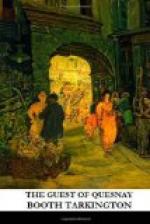Rameau and the little spy managed to get their vociferating burden across the courtyard and into her own door, where she suddenly subsided, disappearing within the passage to her apartment in unexpected silence— indubitably a disappointment to the interested Amedee, to Glouglou, Francois, and the whole personnel of the inn, who hastened to group themselves about the door in attentive attitudes.
“In heaven’s name,” gasped Miss Elizabeth, seizing her cousin by the arm, “come into the pavilion. Here’s the whole world looking at us!”
“Professor Keredec—” Mrs. Harman began, resisting, and turning to the professor appealingly.
“Oh, let him come too!” said Miss Elizabeth desperately. “Nothing could be worse than this!”
She led the way back to the pavilion, and, refusing to consider a proposal on the part of Mr. Ingle and myself to remain outside, entered the room last, herself, producing an effect of “shooing” the rest of us in; closed the door with surprising force, relapsed in a chair, and burst into tears.
“Not a soul at Quesnay,” sobbed the mortified chatelaine—“not one but will know this before dinner! They’ll hear the whole thing within two hours.”
“Isn’t there any way of stopping that, at least?” Ward said to me.
“None on earth, unless you go home at once and turn your visitors and their servants out of the house,” I answered.
“There is nothing they shouldn’t know,” said Mrs. Harman.
George turned to her with a smile so bravely managed that I was proud of him. “Oh, yes, there is,” he said. “We’re going to get you out of all this.”
“All this?” she repeated.
“All this mire!” he answered. “We’re going to get you out of it and keep you out of it, now, for good. I don’t know whether your revelation to the Spanish woman will make that easier or harder, but I do know that it makes the mire deeper.”
“For whom?”
“For Harman. But you sha’n’t share it!”
Her anxious eyes grew wider. “How have I made it deeper for him? Wasn’t it necessary that the poor woman should be told the truth?”
“Professor Keredec seemed to think it important that she shouldn’t.”
She turned to Keredec with a frightened gesture and an unintelligible word of appeal, as if entreating him to deny what George had said. The professor’s beard was trembling; he looked haggard; an almost pitiable apprehension hung upon his eyelids; but he came forward manfully.
“Madame,” he said, “you could never in your life do anything that would make harm. You were right to speak, and I had short sight to fear, since it was the truth.”
“But why did you fear it?”
“It was because—” he began, and hesitated.
“I must know the reason,” she urged. “I must know just what I’ve done.”
“It was because,” he repeated, running a nervous hand through his beard, “because the knowledge would put us so utterly in this people’s power. Already they demand more than we could give them; now they can—”




